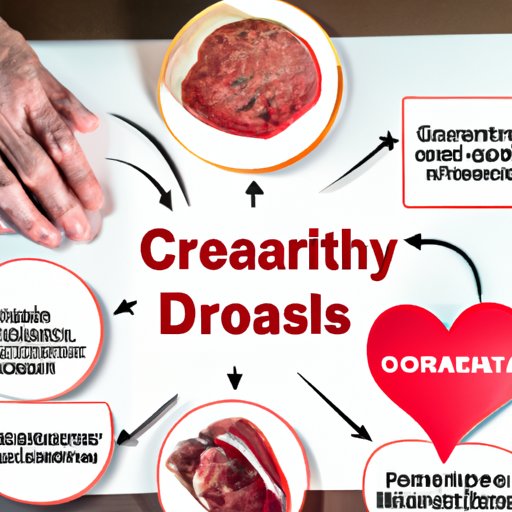
Introduction
Coronary heart disease (CHD) is a prevalent condition that affects millions of people worldwide. In the United States alone, it is estimated that around 18 million adults have CHD. The leading cause of death in the United States is also CHD, accounting for approximately one in every four deaths. In this article, we will explore the science of CHD, its risk factors, and ways to prevent and manage the disease.

A Deep Dive into the Science of Coronary Heart Disease: Understanding the Risk Factors and Contributing Causes
Coronary heart disease is a condition whereby the arteries that supply blood and oxygen to the heart become narrow or completely blocked. The narrowing occurs due to the buildup of plaque, a substance made up of cholesterol and other fats that accumulate over time.
There are several risk factors that contribute to the development of CHD. One primary risk factor is age. As individuals get older, the risk of developing CHD increases. Other risk factors include high blood pressure, high cholesterol, family history, diabetes, obesity, and smoking.
When an individual has CHD, the heart has to work much harder to pump blood throughout the body as the arteries are narrowed. This increased workload often leads to chest pain or discomfort (angina) and can decrease the heart’s effectiveness in pumping blood, leading to heart failure or a heart attack.
The Link Between Unhealthy Eating Habits and Heart Disease
The foods we consume play a significant role in our overall health and wellbeing. An unhealthy diet high in sodium, sugar, unhealthy fats, and processed foods increases the risk of developing CHD. Too much salt can lead to high blood pressure, and diets high in sugar can lead to type 2 diabetes, both of which increase the risk of CHD.
To make healthier dietary choices, individuals can limit their intake of processed foods and choose more whole foods like fruits, vegetables, whole grains, and lean proteins. Limiting the amount of alcohol consumed can also help lower the risk of CHD.
The Impact of Stress and Mental Health on Heart Disease
Stress and mental health play an essential role in the development and management of CHD. When an individual is stressed, their body releases hormones like cortisol and adrenaline. These hormones can narrow the blood vessels and increase blood pressure, contributing to the buildup of plaque.
Effective stress management techniques can help reduce the risk of CHD. Some helpful techniques include exercise, yoga, meditation, and deep breathing exercises. It’s also crucial for individuals to prioritize their mental health and seek help from professionals when necessary.
How a Sedentary Lifestyle Increases Your Risk of Heart Disease
A sedentary lifestyle, characterized by prolonged sitting and a lack of physical activity, has been linked to an increase in the risk of CHD. Regular exercise helps to lower LDL (bad) cholesterol levels and increase HDL (good) cholesterol levels. Exercise also helps to reduce blood pressure, improve insulin sensitivity, and decrease inflammation, reducing the risk of CHD.
It is recommended that adults aim for at least 150 minutes of moderate-intensity exercise or 75 minutes of vigorous-intensity exercise per week. Examples of moderate-intensity exercise include brisk walking, cycling, and swimming, while vigorous-intensity exercise can include running, playing sports, or high-intensity interval training.
The Role of Genetics in Coronary Heart Disease
Genetics plays a crucial role in the development of CHD. Specific genes have been identified that increase an individual’s risk of developing CHD, including genes involved in high blood cholesterol levels and inflammation.
While genetics cannot be changed, individuals can reduce their risk of CHD by adopting a healthy lifestyle. Regular checkups and genetic testing can also help identify individuals at higher risk, allowing for earlier implementation of medical interventions or lifestyle changes.
Preventing and Managing Coronary Heart Disease: Lifestyle Changes and Medical Treatments
Preventing and managing CHD involves lifestyle changes and medical treatments. Making healthy lifestyle choices like engaging in regular exercise, maintaining a healthy diet, quitting smoking, reducing stress, and controlling blood pressure and cholesterol levels can help reduce the risk of CHD.
Medical treatments for CHD can include medications like cholesterol-lowering drugs, blood-thinning medications, and medications to control blood sugar levels in those with diabetes. In more severe cases of CHD, surgery and other interventions like angioplasty or stenting may be necessary.
Conclusion
Coronary heart disease is a prevalent and serious health condition that affects millions of people globally. While there are factors outside of our control like genetics and age, there are several risk factors that individuals can manage to reduce their risk of CHD. By making healthy lifestyle choices and seeking medical intervention when necessary, individuals can take control of their health and reduce their risk of developing or managing CHD.




